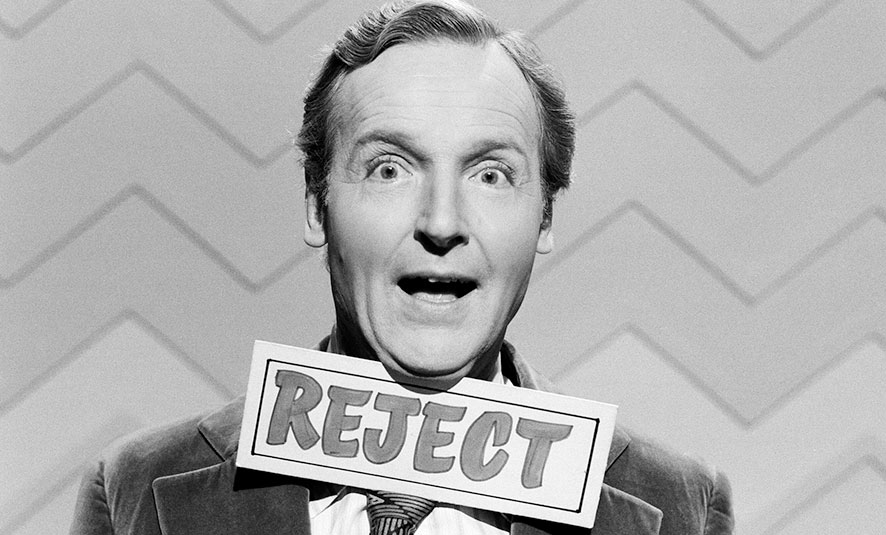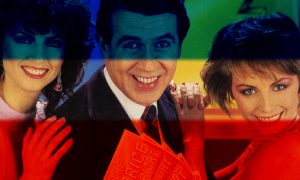
In 2015, TV Cream was fortunate enough to talk to Nicholas Parsons on the eve of the 71st series of Just A Minute. This is what he told us…
Would we be right in thinking, with the BBC, they never commit to future series of Just A Minute, is just gets renewed each year?
That’s right. I think they know I want to come back, but they just phone up and say, “We’re doing some more Just A Minute,” and they run the dates past me. They’re very good like that.
Was there a golden age of Just A Minute or do you always love it as much?
I enjoy it more now, because I think the players have to be sharper and cleverer. It was a disaster when it started – it’s all in my book, by the way. I think a lot of the young comedians today are really much cleverer than the past, because of the demands! Television eats up material so rapidly. They have to be on the ball all the time, think of new ideas and thoughts. That’s why a lot of the comedy today is based on observational humour and things in real life that affect them or their work. And, these people, like Paul Merton and Gyles Brandreth and Julian Clary and Jenny Éclair and Sue Perkins, I mean, they are so good at it. It’s a fiendishly difficult game to play. We make it look good, that’s our job, we’re professionals. There was a period where we had the four regulars – Derek Nimmo, Kenneth Williams, Clement Freud and Peter Jones – and it was getting a little predictable. And probably it would have faded away like two other great panel shows of the time, My Word and My Music. But when Kenneth died, they thought, “Well, the show’s finished”. I said, “No, no no. Kenneth was brilliant in the show, but Kenneth was not Just A Minute,” so we kept going and others came in like Paul, he was the first. And now, we never have the same four players in any one show, so they all spark each other off in different ways, and that’s another reason this has kept going.
It’s very exposing isn’t it?
Oh yes. It is very demanding. But some people come on and the first time they do it they struggle a little. But they find their way of playing it and when they return, they’re very fluent.
Has there been any discussion about the 50th, because that’s two years away?
No, no. It is only two years away. I hope they will make a great thing about it. I hope I’ll be strong enough to be doing it still, ha ha ha! But, erm, yes, it’s only two years away isn’t it? And, er, I have thought about it and I’ve thought, “I do hope they make some special thing of this,” and of course, the thing of which I’m very proud – which you don’t think about at the time – I did the original pilot and I’m still doing it after 48 years. Of course, the amusing thing to me is, I didn’t want the job! The original chairman was going to be Jimmy Edwards. Do you know this story?
We wondered if it was apocryphal story, but, no, it’s clearly not. So you were called in to stand-in?
No, no, no. I took Ian Messiter’s idea up to the BBC because I wanted to do some improvised comedy. I’d just won the award for Radio Personality of the Year for my satirical show Listen To This Space. So I took it up to the head of light entertainment. “Yes, let’s do a show”. And I was going to be on the panel, and I wanted to do that. Jimmy Edwards, they wanted for chairman. We had a wonderful young director who’d just come down from Cambridge called David Hatch. This was David’s very first job, and he was getting very nervous about it. He couldn’t get Jimmy to agree to a recording date. In retrospect, I wonder, perhaps Jimmy didn’t want to do it! But he had made a big success in Does The Team Think, which was a comedy chat show. Anyway, David said, “Listen, will you do me a favour? You be the chairmanship for the pilot, Derek Nimmo’s coming in, we’re getting him on the panel.” And I said, “David, no, I’m not right for that job. I want to go on the panel!” He said, “I’ll make a bargain for you. Do the chairmanship for the pilot and if we get the series, you’re on the panel”. We did the pilot, it didn’t work at all! It was over-egged, as you might say. Ian Messiter is a great inventor, but he thought of ideas like rounds where you couldn’t use the definitive article, or rounds where you couldn’t use plurals! Rounds where you couldn’t have pronouns! It got so itty-bitty, it really was not successful. And they were struggling. They didn’t want it. And this is what I think is one of the romantic things about showbiz – they did not want this programme. They said, “No!” But young David Hatch saw the potential, he was very clever – he finished up as head of broadcasting – and in fact I dedicated the book to him, because if it wasn’t for David we would have never got on the air! He then put his job on the line, I believe, and said, “Listen, I can see how we can make this funny. Please give me a series.” They wanted to keep David Hatch on the staff, so they gave him his series. He came to me and said, “Nicholas, I’ve got a problem. I managed to persuade them to give us a series, the only thing they quite liked in the pilot was your chairmanship.” “David, I was awful!” “I know, but so was everybody else!” But you don’t turn down a whole series of 13 programmes. To begin with, you could tell I was struggling to find a way to present it. I wasn’t ideal. I was a bit too, erm, pompous in a way, really. But what you do in show business is, you get a job – this is a good job – you call on your experience in all the other work you’ve done and you find a way to make that job work for the show and work for you. I found my feet and slowly I evolved and developed and if you listen to the earlier shows, I’m infinitely better now than I was in the earlier ones.
Was that a long process?
I think by the end of the first series I’d found my feet and I was doing it in a way that made the show work. But, look, every show you do you try to improve. If you don’t, you become stale and predictable. And so I go out every night – every time we do a recording – and you can’t rest on your laurels ever in show business. I don’t think, “Well, we’ve done this before, we’ve got a big following, it’ll all happen again”. No, no, otherwise I’d go out there and be boring and predictable and I’d be out of work. I go out there thinking, “We’ve done this before and it’s worked. But will it work again?” Because, remember, it is all spontaneous. It’s all coming straight off the top of our heads. There’s nothing written down! And we are, in professional terms, living dangerously. But some magic happens.
When people stop you in the street, there’s a myriad of things they might want to talk to you about. Can you tell? Do you think, “I reckon they’re going to be a Just A Minute,” or, “They’re going to want to talk about Sale of the Century”?
There’s always something they love. As you just said, some people will remember Sale of the Century, some people remember Just A Minute, some people remember Arthur Haynes. I use the tube a lot, it’s so convenient when I’m in London, because we live in the country. This chap said, “Excuse me. You bear a strong resemblance to Nicholas Parsons”. I said, “Well, I am Nicholas Parsons”. “But… what are you doing on the tube?!” And I said, “Well, it’s the most convenient way to travel”. They probably think, because you’re successful, you should be driven around in a Rolls Royce. Of course, I do get lots of taxis and places and so forth, but sometimes the tube is very convenient. We have a little flat in London and the station’s around the corner. Whether that damages your image, because they think, “Has he slipped? Is he not doing so well?”… But you do get some strange questions. I mean, the funniest one of all was when I was starring in at the Duchess Theatre, which is just off the Alydwich. I’d just split up with Arthur Haynes, and I was starring in the West End. It was probably what I dreamed of doing as a youngster. This fellow stopped me and said, “It’s Nicholas, isn’t it? Nicholas Parsons. Oh, Nicholas, lovely to see you!” and all this stuff. “We haven’t seen you on the box very much recently. Have you retired?” Of course I said, “Look up there,” and he looked up and said, “‘Nicholas Parsons in Boeing Boeing’!” And then he said, “‘Ere, Nicholas. Do you realise sumink? That geezer’s got the same name as you!”
Aren’t they? And that’s quite humanising. Stops you getting too starry.
Yes, of course! Of course! No, I could never… what’s the phrase, you take your success… I take it very lightly, or whatever word you want to say. Never get complacent about your success, because there’s no truer phrase in our profession than, “You’re only as good as your last performance”. Because people say to me sometimes, “Are you thinking of retiring?” I say, “Well, I’m in a profession that retires you.” I’ve only got to do a duff performance, or a series doesn’t go well, and I’m finished.
If we may, we wanted to ask you about Sale of the Century, because that began just in the Anglia region.
Yes, that’s the same thing. Another show I did that started modestly and was only going to be in one area. And it suddenly took off and went to the other areas and became fully networked and then became probably the most successful quiz show in the whole of television at one point. We had 21 million viewers! There are some very good quizzes on now, but they don’t get those sorts of figures.
What are your memories of those early days when it was just a regional show?
Well, I… I was a bit… I don’t know the words. I rather took it for granted, because quizzes didn’t have the same respect within the profession that they do now. And I was just delighted, I had a good job I got a good salary, I enjoyed going up to Norwich, but I never thought of it as anything special. I only realised how special it was when it finished. I got so identified with it that it really was like starting all over again, because they don’t want to put you into plays and films, because you’re a quiz show host. Slowly I convinced them that I was an actor and an all-rounder and I got other work in the West End and elsewhere, and in films,and slowly one started all over again.
Have you always read your reviews?
Oh yes. There are some actors who say, “I never read my reviews.” Well, I think they’re being very pompous. I’m sorry. I read them all, because it’s a learning curve, show business. Every time you do a performance – particularly if I’m on my own doing my one-man show – there’s little nuances that come in. You think, “I mistimed that. Oh, that worked well, I must remember that”. All things you feed in and little things you can feed out. Do, you’re learning all the time, providing you keep your mind open to ways anything can evolve. So, yes, I read them
Talking to you now, you’re remarkably sane, pragmatic, prudent. Have you always had these qualities, or have they come with such a long career?
I think it’s the tough beginning I had. If you’ve worked in a shipyard in the Clyde for five years and dreamed of one day becoming an actor, every little step up that slippery slope is such a reward. You know how tough it can be at the bottom, and you’re just grateful for anything. I’m sure that experience forges your personality and attitude. So, everything I do is a bonus. Every success is a great bonus, but every job is a great bonus. I always wanted to get into show business, my parents didn’t want me to do it. I was born at a time when you did what you were told. My mother thought everybody in show business was a bit debauched or degraded and they steered me away from it. I became an engineer to please them. And against all parental wishes I had to forge my way into this tough, difficult profession and some how I achieved it. Mind you, once I did, they were proud and approved. It is such a tough, tough job and to keep working is as tough as getting your first job! But I love it, and I love the profession, it’s what I dreamed of doing. And I’m still doing it! So that’s what keeps me going!






















THX 1139
February 13, 2020 at 11:38 pm
Possibly the funniest episode of The Comic Strip Presents featured Mr Parsons, he didn’t seem versatile, but he was.
George White
February 14, 2020 at 8:03 am
He also was one of those British actors who tried their luck abroad and had a regular role in a short-lived US sitcom. As the boss in The Ugliest Girl in Town, a peculiar US cash-in on the Swinging London fad starring Peter Kastner, of Coppola’s You’re A Big Boy Now and Patricia “Our Ingrid” Brake about a Hollywood security guard who falls in love with a British actress, so sends away modelling pictures to an agency run by Parsons in London, only for the pictures of the hippy-clothed Kastner to be mistaken as female, so now as “Timmie”, he must live a double-life.
Shot in London, rather than at a backlot, it lasted one series, and didn’t even get shown in London, though other ITV regions picked it up.